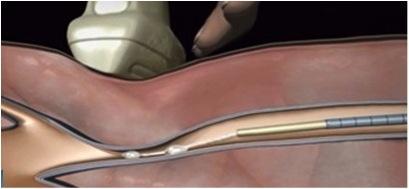
May 5, 2017 — Medtronic plc recently announced three-year outcomes from the VeClose U.S. pivotal clinical trial and one-year data from the WAVES study. Both results were presented by Kathleen Gibson, M.D., of Lake Washington Vascular in Bellevue, Wash., at the 2017 Charing Cross Symposium in London. The new data demonstrate the clinical and quality of life benefits of the Medtronic VenaSeal closure system in treating patients with venous reflux disease.
The VeClose U.S. pivotal clinical trial is a prospective, randomized, controlled trial comparing the safety and effectiveness of the VenaSeal closure system to the Medtronic ClosureFast endovenous radiofrequency ablation (RFA) procedure in a non-inferiority design. The trial enrolled 242 patients with symptomatic refluxing great saphenous veins (GSV), of which 222 were randomized 1:1 to receive treatment with VenaSeal or ClosureFast.
At three-years, the complete closure of the GSV was achieved in 94.4 percent of patients treated with VenaSeal compared to 91.9 percent of patients treated with ClosureFast — showing both the continued long-term, non-inferior outcomes (p=0.005) and the durability of the treatment.
Additionally, patient improvement was rated on three assessments: Venous Clinical Severity Score (VCSS), a clinical venous disease assessment; and the Aberdeen Varicose Vein Questionnaire (AVVQ) and EQ-5D — both of which provide patient-reported quality of life scores. In all three assessments, patients treated with either VenaSeal or ClosureFast reflected statistically significant improvement from baseline.
"The three-year outcomes for this randomized trial reinforce the consistent clinical performance of VenaSeal and ClosureFast," said Gibson. "These long-term VenaSeal data along with post-market WAVES study results continue to build on the prior findings for this innovative treatment option for venous reflux disease, demonstrating safety, effectiveness, and quality of life."
In a separate session at Charing Cross, Gibson presented the one-year data from the independent, physician-initiated WAVES study, demonstrating quality of life impacts along with safety and effectiveness of the VenaSeal closure system. The single-center study enrolled 50 patients in a real-world assessment of the treatment of one or more incompetent truncal veins in a single setting without mandatory post-operative compression stockings.
Key findings from the WAVES study are summarized as follows:
- The one-year GSV closure rate for VenaSeal was 100 percent. In comparison, the GSV closure rate for VenaSeal in VeClose, which required post-operative compression stockings, was 96.8 percent. Further, the mean vessel diameter in WAVES was larger than in VeClose; and
- The mean time for patients' return to work was 0.2 days ± 1.1 days. Furthermore, the mean time for returning to normal activities, including a patient's exercise routine, was 2.4 days ± 4.1 days.
For more information: www.medtronic.com


 January 05, 2026
January 05, 2026 









